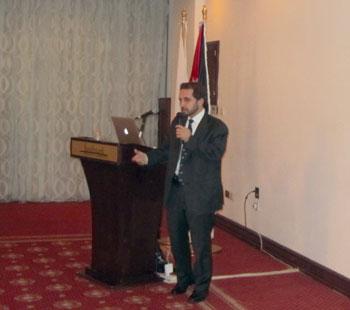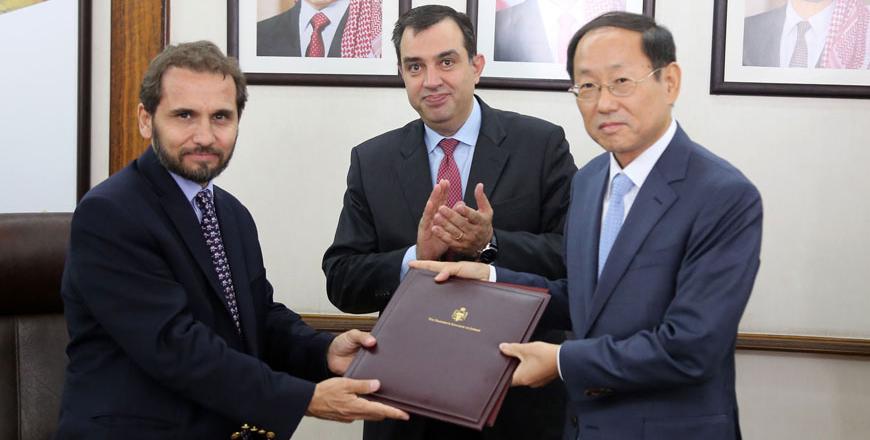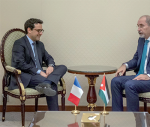You are here
Jordan has come a long way in de-mining efforts — Prince Mired
By Abeer Numan - Jan 06,2016 - Last updated at Jan 06,2016

HH Prince Mired delivers a lecture on the Ottawa Treaty in Amman on Tuesday (Photo courtesy of Jordanian Korean Friendship Association)
AMMAN — HH Prince Mired on Tuesday underscored the serious dangers of minefields and unexploded ordnance, noting that Jordan has come a long way in its efforts to end the scourge of minefields, with the support of donors.
“In Jordan, we have more or less finished, but there is still the problem of unaccounted-for mines in the Jordan Valley,” noted Prince Mired, chairman of the National Committee for De-mining and Rehabilitation (NCDR) and special envoy of the Anti-Personnel Mine Ban Convention, also known as the Ottawa Treaty.
At a lecture attended by HH Princess Dina Mired and Korean Ambassador Choi Hong-ghi and his wife, the prince commended South Korea’s assistance to the Kingdom “to end this part of the puzzle”.
“We are very grateful to the government of Korea,” the prince said in the lecture on the Ottawa Treaty, hosted by the Jordanian Korean Friendship Association (JKFA).
Last September, South Korea presented a $300,000 grant to the NCDR to fund a project to search for lost mines in the Jordan Valley.
Prince Mired acknowledged that the issue of landmines is not getting the same amount of attention it used to some years ago, despite the persisting dangers and serious consequences, as international attention has shifted to other matters.
“When wars end, landmines and bombs remain,” he said, noting that some countries still have bombs and ordnance from World War I.
The convention’s goals, according to the prince, basically include the pursuit of universal acceptance and the pledge never to use or transfer landmines, besides the destruction of existing stocks and implanted anti-personnel mines.
“The ultimate goal is to get all countries to accede to the convention,” he told the attendees, who also included Korean Commercial Attaché Chul Noh, and several members of the Korea Business Centre Amman and the JKFA, as well as university professors.
Highlighting his role as a special envoy of the convention and endeavours to persuade countries to accede to it, Prince Mired said 35 states are still not signatories to the treaty, “a subject matter that I have been working on for 11 years”.
The US and South Korea have not acceded to the convention, but “in spirit, they are part of it”, he noted.
Citing the hardships people suffer as a result of minefields and other explosive remnants of war, the prince said cases vary, with some only losing fingers and others losing their hands or eyes as soon as they touch a landmine.
In Jordan, there are some 900 victims.
“We feel guilty [that] we have not been able to support them in the right way for financial reasons,” the prince said, pointing out that under the convention, donors are obliged to assist victims.
Prince Mired explained that most of the landmine victims live in rural areas, which makes it harder to provide them with the required care.
He recalled a meeting with a Jordanian soldier who had lost his hands and eyes in a mine explosion.
“Lovely chap, but he can’t do a thing on his own,” the prince said.
In many cases, it is silent victims who suffer as nobody hears about them, since some are afraid of reporting their injuries, he added.
Responding to a question on the current situation in Arab countries, Prince Mired said prior to the crisis, landmines were not a major problem in Syria, but a massive cleaning operation is needed now due to the presence of so much unexploded ordnance.
Libya also faces a tremendous problem since World War II and the time of Muammar Qadhafi, he added, describing the contamination in Libya as “huge”.
Yemen is also among the countries dealing with landmines.
“But Iraq is probably the worst,” as it has been in conflict since the war with Iran; the same problem exists in Sudan, Algeria and Morocco, the prince told The Jordan Times.
Replying to a question on why his country has not acceded to the Ottawa Treaty yet, the Korean ambassador said: “It is because of security reasons, because Korea has been constantly confronting provocations of North Korea.”
The conclusion from the military — at a recent meeting — is “the time has not come yet to join”, the ambassador added.
“I hope the time will come soon for that. We are using mines only along the DMZ [the Korean Demilitarised Zone] lines, where it is no-man’s land and nobody can live there... We are reducing reliance on these.”
Created by agreement between North Korea, China and the UN in 1953, the DMZ is the buffer zone between North and South Korea. It is 250km long and about 4km wide.
Related Articles
AMMAN — Korea has presented a $300,000 grant to the National Committee for De-mining and Rehabilitation (NCDR) as a contribution to fund the
AMMAN — HH Prince Mired on Wednesday inaugurated an international conference on helping the victims of anti-personnel landmines and explosiv
HH Prince Mired has renewed calls on the US to join the 1997 Anti-Personnel Mine Ban Convention, which bans the use, stockpiling, production and transfer of anti-personnel mines.















